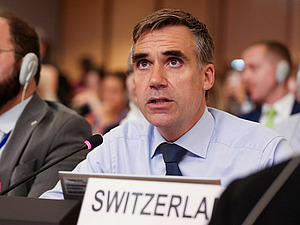"Reducing emissions remains the best adaptation measure"
Voices on climate
Felix Wertli is the head of the Swiss delegation to the COP30 climate conference in Belém, Brazil. For the past two years, he has served as Ambassador for the Environment at the Swiss Federal Office for the Environment (FOEN). (Photo: Florian Fussstetter)
Felix Wertli is the head of the Swiss delegation to the COP30 climate conference in Belém, Brazil, scheduled for November. After studying in Geneva, the 48-year-old geographer completed a postgraduate degree in development cooperation at ETH Zurich. He then worked for various NGOs before moving to the Swiss Federal Government, where he was initially responsible for United Nations (UN) and World Trade Organisation (WTO) issues in Geneva. For the past two years, he has served as Ambassador for the Environment at the Swiss Federal Office for the Environment (FOEN).
COP30, the 30th UN Climate Change Conference, will take place in Belém,Brazil, from 10 to 21 November 2025. Prior to the meeting, we were able to interview Felix Wertli. He is optimistic ahead of the meeting and is convinced of the potential of the multilateral approach.
What are the Swiss delegation's hopes and goals for the conference in Belém?
Felix Wertli: At COP30, we will work to ensure that the goal of limiting global warming to 1.5 degrees C remains within reach. This requires ambitious climate targets from countries with high greenhouse gas emissions. And there is hope – even if, ten years after the Paris Agreement, there is a lot of negative news in the media. What we are seeing is that the climate is still a priority for many people and governments. A few weeks ago, around 120 government members reported on their progress at the UN General Assembly. This shows that we have achieved a lot thanks to the Paris Agreement. In 2015, we were on track for a temperature increase of 4 degrees C. Today, we are on track for between 2.3 and 2.8 degrees C, provided that countries' climate targets are implemented.
Are there any other examples?
Yes, today two trillion US dollars are invested annually in renewable energies worldwide and one trillion in fossil fuels. Of the energy capacity added globally each year, 80 per cent was renewable last year. The trend is also positive in electric mobility: five years ago, one in 50 cars sold worldwide was electric; today it is one in five. Decarbonisation is underway. The question is how quickly countries can drive this development forward and how sustainably. Collectively, the Paris Agreement has achieved a great deal; it is robust. At the same time, we are not on track to meet the 1.5-degree C target that has been set. This means we need to set a more ambitious goal and accelerate implementation. That is our priority at COP30.
So you firmly believe in the multilateral approach, even though the world is becoming more nationalistic again today?
As a small country, we are particularly dependent on multilateral solutions. Switzerland has submitted its new, strengthened climate target under the agreement. However, climate change is a good example of a challenge that can only be tackled by all countries working together. This also requires the participation of countries with high emissions. Our goal at COP30 will be to ensure that the national climate targets of all countries are analysed and better implemented through joint efforts.
Our research at FiBL is increasingly focused on climate adaptation. Is this trend also noticeable at the World Climate Conference?
Absolutely. Climate change is becoming more noticeable, making adaptation an increasingly important issue. However, reducing emissions remains the best adaptation measure. Unfortunately, we are seeing science coming under increasing pressure in international negotiations. The climate negotiation process is strongly based on scientific principles. Switzerland is strongly advocating for science-based climate policy and scientific independence in the negotiations.
Switzerland has been working with a diverse group of other countries (Mexico, Liechtenstein, Monaco, the Republic of Korea and Georgia) for over 20 years. How did this collaboration come about, and what does it bring to Switzerland and its partner countries?
In many cases, you need to be part of a group in order to make your voice heard in climate negotiations. Our group is interesting because it includes countries with very different starting points in the negotiations. Industrialised countries, emerging economies and developing countries bring their views together here. Switzerland chairs this group, which gives us better access to important decision-making bodies, among other things.
Interview: Adrian Krebs, FiBL
Further information
Link
blw.admin.ch: Climate Strategy for Agriculture and Food 2050




